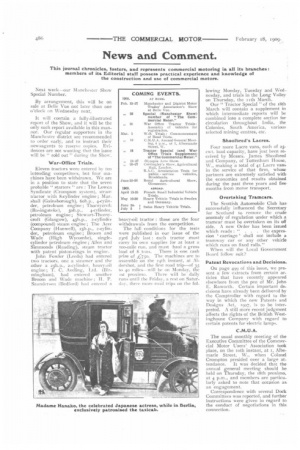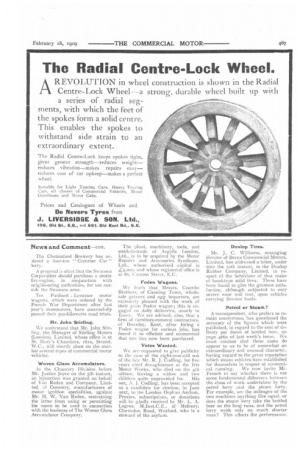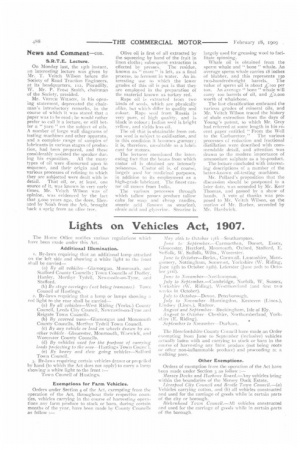News and Comment.
Page 8

Page 9

Page 10

If you've noticed an error in this article please click here to report it so we can fix it.
This journal chronicles, fosters, and represents commercial motoring in all its branches: members of its Editorial staff possess practical experience and knowledge of the construction and use of commercial motors.
Next week—our Manchester Show Special Number.
By arrangement, this will be on sale at Belle Vue not Iater than one o'clock on Wednesday next, It will contain a fully-illustrated report of the Show, and it will be the only such report available in this manner. Our regular supporters in the Manchester district are recommended to order early, and to instruct their newsagents to reserve copies. Evidences are not wanting that the issue will be " sold out " during the Show.
War-Office Triads.
Eleven tractors were entered by tell intending competitors, but four machines have been withdrawn, We are in a position to state that the seven probable " starters " are : The Lowca Syndicate (Crompton system), swam tractor with 8-cylinder engine ; Marshall (Gainsborough), ooh .p., 4-cydnder, petroleum engine; Thornycroli (Basingstoke), 5oh.p., 4-cylinder, petroleum engine; Stewart-Thornycroft (Glasgow), 45h.p., 2-cylinder (compound) steam engine ; The Acer Company (HanweII), 25h.p., 2-cylinder, petroleum engine; Broom and Wade (High Wycombe), singlecylinder petroleum engine; Alien and Simrnonds (Reading), steam tractor with patent piston-rings in engine.
John Fowler (Leeds) had entered two tractors, one a steamer and the other a 25h.p., 2-cylinder, heavy-oil engine; T. C. Ayeling, Ltd. (Birmingham), had entered another Broom and Wade machine; TT. P. Saunderson (Bedford) had entered a heavy-oil tractor : these are the four withdrawals from the competition.
The full conditions for the tests were published in our issue of the 23rd July last ; each tractor must carry its own supplies for at least a too-mile run, and must haul a gross
load of 8 tons, There is one cash pri7e of £7so. The machines are to assemble on the 24th instant, at Aldershot, and the first road trip—of 35 to 40 mites—will he on Monday, the
ist proximo. There will be daily runs until the Friday, a rest on Saturday, three more road trips on the fol lowing Monday, Tuesday and Wed-nesday, and trials in the Long Valley on Thursday, the tith March. Our" Tractor Special " of the I8th March will contain a supplement in which intermediate reports will be combined into a complete section for circulation throughout India, the Colonies, South America, various selected mining centres, etc.
Shoolbred's ',acres.
Four more Lacre vans, each of 25cwt. load capacity, have just been received by Messrs. James Shoolbred and Company, of Tottenham House, W., making a total of 41 Lacre vans in the service of that firm, whose partners are extremely satisfied with the economies and results obtained during the past three years and five. months from motor transport.
Overtaking Tramcars.
The Scottish Automobile Club has. successfully influenced the Secretary for Scotland to remove the crude anomaly of regulation under which a tramcar must be overtaken on its off side. A new Order has been issued
which reads : " . the expression ' carriage ' shall not include a tramway car or any other vehicle which runs on fixed rails."
When will the Local Government Board follow suit?
Patent Revocations and Decisions.
On page 499 of this issue, we present a few extracts from certain articles that have recently appeared elsewhere from the pen of Mr, John E. Raworth. Certain important decisions have already been delivered by the Comptroller with regard to the way in which the new Patents and Designs Act, 1907, is to be interpreted. A still more recent judgment affects the rights of the British Westinghouse Company with regard to certain patents for electric lamps.
C.M.U.A.
The usual monthly meeting of the Executive Committee of the Commercial Motor Users' Association took place, on the moth instant, at r, Albemarle Street, W., when Colonel Crompton presided over a large at tendance. It was decided that the annual general meeting should be held on Thursday, the r8th proximo, at 4 p.m., and members are particularly asked to note that occasion as. an engagement. Correspondence with several Dock Committees was reported, and further instructions were given in regard to the conduct of negotiations in this connection. The Chelmsford Brewery has ordered a four-ton " Commer Car " lorry.
A proposal is afoot that the Swansea Corporation should purchase a motor fire-engine, in conjunction with neighbouring authorities, for use outside the Swansea area.
Ten Panhard Levassor motor wagons, which were ordered by the French War Department after last year's manceuvres, have successfully passed their 500-kilometre road trials.
Mr. John Stirling.
We understand that Mr. John Stirling, the Manager of Stirling Motors (London), Limited, whose office is at St. Mary's Chambers, 161a, Strand, W.C., will shortly place on the market several types of commercial motor vehicles.
Woven Glass Accumulators.
in the Chancery Division before Mr. Justice Joyce on the 5th instant, an injunction was granted on behalf of Van Raden and Company, Limited, of Coventry, manufacturers of motor ignition specialities, against Mr. H. W. Van Raden, restraining the latter from using or permitting his name to be used in connection with the business of The Woven Glass Accumulator Company. The plant, machinery, tools, and stock-in-trade of Argylls London, Ltd., is to be acquired by the Motor Repairs and Accessories Syndicate, Ltd., whose authorised capital is .";5,000, and whose registe-red office is at 86, Cannon Street, H.C.
Foden Wagons.
We learn that Messrs. Coombe Brothers, of Canning Town, wholesale grocers and egk importers, are extremely pleased with the work of their s-ton Foden wagon ; this is engaged on daily deliveries, mostly in EssexWe are advised, also, that a firm of furniture-removal contractors, of Bromley, Kent, after hiring a Foden wagon for various jobs, has found it so efficient and economical that one has now been purchased.
Votes Wanted.
We are requested to give publicity to the case of the eight-year-old son of the late Mr. R. J. Codling, for five years chief draughtsman at the Iris Motor Works, who died on the 4th ultimo, leaving a widow and two
children quite unprovided for. His
son, J. Codling, has been accepted as a candidate for election, in June next, to the London Orphan Asylum. Proxies, subscriptions, or donations will be gladly received by Mr. L. A. Legros, M.inst.C.E., of Melbury, Clarendon Road, Watford, who is a steward of the asylum.
Dunlop Tires.
Mr. J. C. Williams, managing director of Berna Commercial Motors, Limited, has addressed a letter, under date the loth instant, to the Dunlop Rubber Company, Limited, in respect of the behaviour of that make of band-type solid tires. These have been found to give the greatest satisfaction, although subjected to very severe wear and tear, upon vehicles carrying five-ton loads.
Petrol or Steam ?
A correspondent, who prefers to remain anonymous, has questioned the accuracy of the figures which were published, in regard to the cost of delivery per dozen of bottled beer, on page 466a of last week's issue. We must confess that these costs do appear to us to be of somewhat an extraordinary and unusual character, having regard to the great reputation which steam vehicles have established for themselves in respect of economical running. We now invite Mr. French to say whether there is not some fundamental difference between the class of work undertaken by the petrol lorry and the steam lorry_ For example, are the mileages of the two machines anything like equal, or does the steam lorry take the bottled beer on the long runs, and the petrol lorry work only on much shorter runs? This affects the performance. S.R.T.E. Lecture.
On Monday last, the isth instant, an interesting lecture was given by Mr. T. Veitch Wilson before the Society of Road Traction Engineers, at its headquarters, i 12, Piccadilly, W. Mr. P. Frost Smith, chairman of the Society, presided.
Mr. VEITCH WILSON, in his opening statement, deprecated the chairman's introductory remarks, in the course of which It was stated that a Paper was to he read; he would rather prefer to call it a lecture, or still better a " yarn " on the subject of oils. A number of large wall diagrams of testing machines and other apparata, and a complete range of samples of lubricants in various stages of production, had been prepared, and these considerably assisted the speaker dur
ing his exposition. All the many types of oil were discoursed upon in sequence, and their origin and the various processes of refining to which they are subjected were dealt with in
detail. That oil; or, at least, one source of it, was known in Very early times, Mr. Veitch Wilson was of Opinion, was evidenced by the fact that 5,000 years ago, the dove, liberated by Noah from the Ark, brought back a sprig from an olive tree.
Olive oil is first of all extracted by the squeezing by hand of the fruit in linen cloths; subsequent extraction is effected by presses. The residue, known as " mare " is left, as a final process, to ferment in water. An interesting use to which the lower
grades of this oil is put is that they are employed in the preparation of the material known as turkey red.
Rape oil is extracted from two kinds of seeds, which are physically alike, but which differ in quality and colour. Rape seed from Russia is very pure, of high quality, and is black in colour; Indian seed is bright yellow, and Yields less oil.
The oil that is obtainable from cotton seed is subject to oxidisation, and in this condition it beeomes gummy ;
it is, therefore, flti a lubricant for motors.
The lecturer mentioned the interesting fact that the beans from which castor oil is obtained are intensely poisonous. Castor oil is, of course, largely used for inedicinal purposes, in addition to its employment as a high-grade lubricant. The finest castor oil comes from India.
The various processes through which tallow passes produce tallow cake for soap and cheap candles, stearic acid (known as stearine), oleaie acid and glycerine. Stearine is largely used for greasing wool to facilitate spinning.
Whale oil is obtained from the sperm whale and " bone " whale. An average sperm whale carries 18 inches of blubber, and this represents rio two-hundredweight barrels. The value of sperm oil is about ,Icict per ton. An average " hone " whale will carry too barrels of oil, and .472,000 worth of whalebone.
The last classification embraced the various grades of mineral oils, and Mr. Veitch Wilson traced the history of shale extraction from the days of Young's patent, to which Mr. Grey had referred at some length in his recent paper entitled " From the Well to the Carburetter." The various processes of reduction and fractional distillation were described with commendable detail, and attention was drawn to the modern importance of ammonium sulphate as a by-product.
The lecture concluded with interesting descriptions of a number of the better-known oil-testing machines.
?1r. Pollard's: proposition that the discussion should be postponed to a later date, was seconded by Mr. Kerr Thomas, and passed by a show of hands. A vote of thanks was proposed to Mr. Witch Wilson, on the motion of Mr. Barber, seconded by Mr. Hardwick. •
























